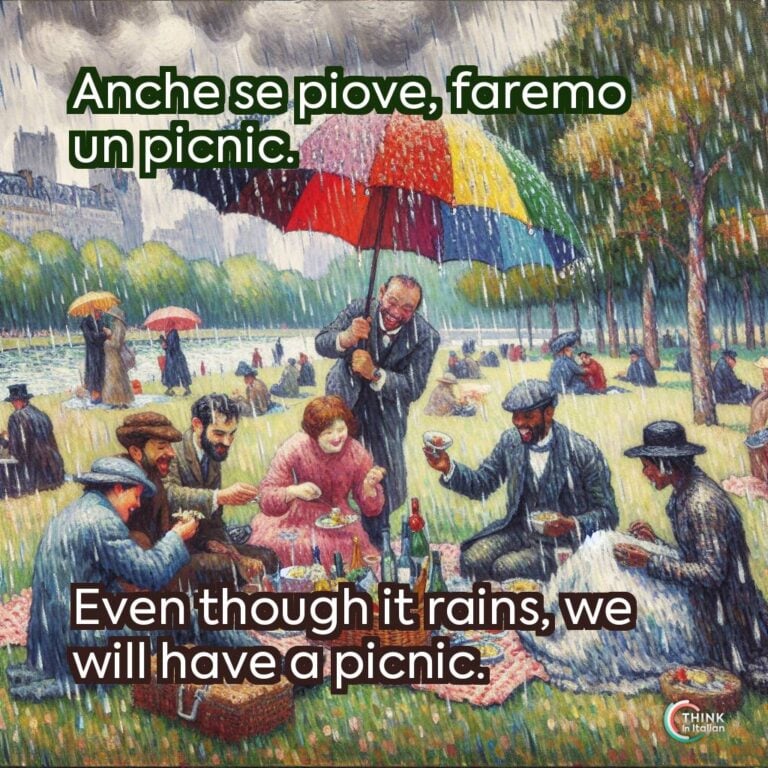“Even Though” and “Even if” in Italian
Anche se
Anche se is the most common phrase used for both “even though” and “even if“. It is composed of the conjunction anche and the conjunction se and is the most versatile option, as it works in both real and hypothetical scenarios.
For this reason, it can be followed by both indicative and subjunctive mood.
Anche se piove, andrò a correre.
Even though it’s raining, I’ll go for a run.
Anche se vincessi la lotteria, continuerei a lavorare.
Even if I won the lottery, I would keep working.
Seppure
Seppure is a more formal alternative that is mainly used for hypothetical situations. For this reason, it is always followed by the subjunctive mood.
It is the combination of the conjunction se and the conjunction pure, literally translating into “if also”.
Seppure facesse freddo, verrei alla festa.
Even if it were cold, I would come to the party.
Sebbene
Sebbene is another option to translate “even though” or “although” and is used for hypothetical situations, always followed by the subjunctive mood.
It is the combination of the conjunction se and the adverb bene, literally translating into “if good”.
Sebbene fosse malato, è andato al lavoro.
Although he was sick, he went to work.
How to use “Anche se”
“Anche se” + Indicativo
In most everyday situations where anche se is used to express real, factual conditions, it is followed by the indicative mood. Of course, all verb tenses are possible, because events can occur at all times:
Anche se sei stanco, devi finire il lavoro.
Even though you’re tired, you have to finish the work.
Anche se faceva freddo, siamo usciti lo stesso.
Even though it was cold, we went going out anyway.
Anche se perderemo la partita, saremo contenti di aver giocato.
Even though we will lose the game, we will be happy that we’ve played.
“Anche se” + Congiuntivo
When anche se is used to express hypothetical situations, it is followed by the subjunctive mood. This shifts the meaning to “even if“, signaling that the condition that is being described is not real but only possible.
Only the imperfect subjunctive and the past perfect subjunctive can be used with this expression:
- imperfetto
Anche se fosse ricco, vivrebbe una vita semplice.
Even if he were rich, he would live a simple life.
- trapassato
Anche se avessi visto un UFO, non avrei creduto agli alieni.
Even if I saw a UFO, I wouldn’t have believed in aliens.
How to use “Seppure”
Seppure is typically used in formal situations or writing, and it’s especially useful when you want to emphasize a hypothetical condition, which triggers the use of the subjunctive mood.
It can be exchanged with anche se when this is used in hypothetical sentences, although seppure adds a more formal tone.
Seppure tu non venissi, la festa sarebbe divertente.
Even if you didn’t come, the party would be fun.)
Seppure avesse fatto freddo, sarei venuto comunque.
Even if it had been cold, I would have come anyway.
How to use “Sebbene”
Sebbene is structurally similar to seppure as it is always followed by the subjunctive mood. However, it is used to express a situation that cannot be changed, taking on the meaning of “in spite of the fact that” or “despite the fact that“.
For this reason, it resembles way more nonostante than the other options. Moreover, unlike anche se when followed by the subjunctive mood and seppure, sebbene can be used with all tenses and can more easily be translated as “even though“:
Sebbene piova, faremo la festa all’aperto.
Even though it’s raining, we’ll have the party outdoors.
Sebbene abbia mangiato, ho ancora fame.
Although I ate, I am still hungry.
- imperfetto
Sebbene fosse stanco, Luca mi ha aiutato con il trasloco.
Even though he was tired, Luca helped me with moving.
- trapassato
Sebbene avessimo comprato molto cibo, gli invitato hanno avuto fame.
Although we bought a lot of food, the guests were hungry.




